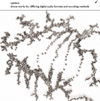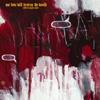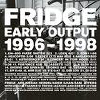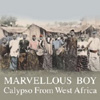 Presenting a whopping 24 tracks in just over 45 minutes, this album is exactly what it says it is: a series of drone works the titles of which indicate the digital works' file type, size, bitrate and other pieces of information. If this sounds like a disjointed mess however—and you couldn't be blamed if the quantity and brevity of the material suggested as much—don't be fooled. This is an extended work whose whole is simply attained through the slight differences afforded by so many partitions.
Presenting a whopping 24 tracks in just over 45 minutes, this album is exactly what it says it is: a series of drone works the titles of which indicate the digital works' file type, size, bitrate and other pieces of information. If this sounds like a disjointed mess however—and you couldn't be blamed if the quantity and brevity of the material suggested as much—don't be fooled. This is an extended work whose whole is simply attained through the slight differences afforded by so many partitions.
Two new shows just for you. We have squeezed out two extended release episodes for this weekend to get you through this week. They contain mostly new songs but there's also new issues from the vaults. The first show features music from Rider/Horse, Mint Field, Robert Aiki Aubrey Lowe, Anastasia Coope, ISAN, Stone Music, La Securite, Bark Psychosis, Jon Rose, Master Wilburn Burchette, Umberto, Wand, Tim Koh, Sun An, and Memory Drawings. The second episode has music by Laibach, Melt-Banana, Chuck Johnson, X, K. Yoshimatsu, Dorothy Carter, Pavel Milyakov, Violence Gratuite, Mark Templeton, Dummy, Endon, body / negative, Midwife, Alberto Boccardi, Divine. Cow in Maui from Veronika in Vienna. Get involved: subscribe, review, rate, share with your friends, send images! |



 An hour of mostly solo cornet played in a French monastery might seem a strict challenge. And that's the point here as Rob Mazurek battles his more extreme urges on 11 compositions recorded at Fontevraud l'Abbaye and dedicated to the controversial Robert D'Arbrissel who founded it in 1099.
An hour of mostly solo cornet played in a French monastery might seem a strict challenge. And that's the point here as Rob Mazurek battles his more extreme urges on 11 compositions recorded at Fontevraud l'Abbaye and dedicated to the controversial Robert D'Arbrissel who founded it in 1099. Campbell Kneale may longer be known as Birchville Cat Motel, but he certainly has not stopped making abrasive, nightmarish music. Surprisingly, curating a Prince tribute album (Shutupalreadydamn!) has failed to translate into a funkier, sexier Neale. Stillborn Plague Angels is exactly the sort of album that Satan would make if he had the time and inclination to start a noise band.
Campbell Kneale may longer be known as Birchville Cat Motel, but he certainly has not stopped making abrasive, nightmarish music. Surprisingly, curating a Prince tribute album (Shutupalreadydamn!) has failed to translate into a funkier, sexier Neale. Stillborn Plague Angels is exactly the sort of album that Satan would make if he had the time and inclination to start a noise band. Italian mutant jazz-metal no-wavers Zu have been plying their bludgeoning trade in the underground for a decade, but it seems that they are finally receiving some widespread attention now that they are signed to Mike Patton's Ipecac label. In the past, they have collaborated with a staggering and varied array of folks, ranging from free jazz icons to members of Can, The Stooges, the Ex, Sonic Youth, and Dälek. On Carboniferous, they largely opt to go it alone, although Mike Patton and King Buzzo make somewhat dubious contributions.
Italian mutant jazz-metal no-wavers Zu have been plying their bludgeoning trade in the underground for a decade, but it seems that they are finally receiving some widespread attention now that they are signed to Mike Patton's Ipecac label. In the past, they have collaborated with a staggering and varied array of folks, ranging from free jazz icons to members of Can, The Stooges, the Ex, Sonic Youth, and Dälek. On Carboniferous, they largely opt to go it alone, although Mike Patton and King Buzzo make somewhat dubious contributions. Over ten years after the last of these tracks were recorded the members of Fridge have selected their favorite songs from their slew of releases on Output Recordings, the label that first championed them. Luckily they turned out to be my favorites as well. With headphones on and 80 minutes of their choicest cuts cued up, it is hard to be unhappy. The relentless pace Fridge showed, in both their rhythms and sheer number of songs recorded over a two year period, would exhaust the creative energies of many musicians. They were just getting warmed up. Listening back, after a decade of new developments and notable side projects, we can trace the trajectory they have followed, and hear within these songs, many points of origin.
Over ten years after the last of these tracks were recorded the members of Fridge have selected their favorite songs from their slew of releases on Output Recordings, the label that first championed them. Luckily they turned out to be my favorites as well. With headphones on and 80 minutes of their choicest cuts cued up, it is hard to be unhappy. The relentless pace Fridge showed, in both their rhythms and sheer number of songs recorded over a two year period, would exhaust the creative energies of many musicians. They were just getting warmed up. Listening back, after a decade of new developments and notable side projects, we can trace the trajectory they have followed, and hear within these songs, many points of origin. Led by Dave Heumann, Arbouretum doesn't beat around the bush. Out of the gate they make it very clear exactly what rock 'n' roll means to them: huge melodies, rolling rhythms, noisy solos, and few introspective moments for good measure. Over eight concise songs, the band wrings the guitar for everything its worth and then some.
Led by Dave Heumann, Arbouretum doesn't beat around the bush. Out of the gate they make it very clear exactly what rock 'n' roll means to them: huge melodies, rolling rhythms, noisy solos, and few introspective moments for good measure. Over eight concise songs, the band wrings the guitar for everything its worth and then some. Consisting of only seven spare pieces lasting just over 25 minutes in length, Tenniscoats find themselves having to make a lot out of a little on this disc. That the duo of Saya and Ueno are displaced from their Tokyo home base and immersed in the Amazon rainforest for a series of essentially live recordings seems as though it would leave even less room for error. Yet this distillation results in a poignant intimacy that seeks and finds its own niche in the realm of location-based music interactions.
Consisting of only seven spare pieces lasting just over 25 minutes in length, Tenniscoats find themselves having to make a lot out of a little on this disc. That the duo of Saya and Ueno are displaced from their Tokyo home base and immersed in the Amazon rainforest for a series of essentially live recordings seems as though it would leave even less room for error. Yet this distillation results in a poignant intimacy that seeks and finds its own niche in the realm of location-based music interactions. Done right, calypso conveys succinct unpretentious pleasure. In the wrong hands, though, it can be murderously bad. Thankfully, there is no over production or lyrical inanity to interfere with the simple, timeless enjoyment of this consistent collection from 1950s West Africa.
Done right, calypso conveys succinct unpretentious pleasure. In the wrong hands, though, it can be murderously bad. Thankfully, there is no over production or lyrical inanity to interfere with the simple, timeless enjoyment of this consistent collection from 1950s West Africa. Jarboe is an artist that is very much at the mercy of her collaborators; a strong band behind her and she flourishes but accompanied by a weaker artist she flounders. This has made for a patchy career, the dizzying power of her performances with Swans has not been a constant presence in her work but in recent years her work with Neurosis and Larsen has shown that her drive is still there. Her latest album sees her play with a group that can be every bit as crushing as any other modern metal band and also allow Jarboe’s softer side to shine through.
Jarboe is an artist that is very much at the mercy of her collaborators; a strong band behind her and she flourishes but accompanied by a weaker artist she flounders. This has made for a patchy career, the dizzying power of her performances with Swans has not been a constant presence in her work but in recent years her work with Neurosis and Larsen has shown that her drive is still there. Her latest album sees her play with a group that can be every bit as crushing as any other modern metal band and also allow Jarboe’s softer side to shine through. On the cover of his latest album Will Oldham's portrait looks more like a bare skull than a human head, the sleeve is reminiscent of Neil Young's Tonight's the Night. Because of this grim cover and the album's portentous title I was expecting a much darker affair, but this is anything but dark. Oldham has sketched out a country album that has far more in common with the cheerier parts of Young’s Nashville recordings. Employing over a dozen musicians for these sessions, Oldham has made his slickest album yet but without sacrificing the soul of his music.
On the cover of his latest album Will Oldham's portrait looks more like a bare skull than a human head, the sleeve is reminiscent of Neil Young's Tonight's the Night. Because of this grim cover and the album's portentous title I was expecting a much darker affair, but this is anything but dark. Oldham has sketched out a country album that has far more in common with the cheerier parts of Young’s Nashville recordings. Employing over a dozen musicians for these sessions, Oldham has made his slickest album yet but without sacrificing the soul of his music.
